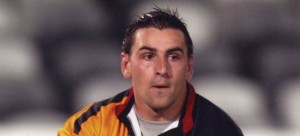
Both former Rugby Sevens’ footballer, Matt Sonter, and founder of Black on Track, Brian Dowd, consider themselves lucky that they never started smoking.
Matt Sonter has had a long illustrious career as a professional rugby union player spanning more than 13 years that has seen him travel the world and represent his country.
During his career, Matt played in the Australian Seven’s rugby team and the Queensland Reds among others.
Matt says he is lucky he never wanted to smoke.
“As a kid growing up with a parent that smoked, you either went one way or the other and I was a kid that absolutely despised it,” he says.
“It was one of those Catch-22 situations – none of my siblings chose to take it up – it must have been in our genetic makeup to not like it.”
Matt says most young people are aware of the dangers of smoking these days.
“We have all heard the information around us that tells us it is bad and that smoking makes it harder for us to breathe, and every inch on a field can make a difference and if you can play a game at an elite level and you are half-good and you do smoke, you would probably be absolutely fantastic if you didn’t,” he says.
Matt is a Community Development Worker on the NSW Central Coast and he runs a healthy lifestyle program there called the Ngura (meaning My Place) Program, which is conducted in schools. In the program, young people study health and lifestyle issues.
“We talk about health issues such as diabetes and cardio-vascular disease and when we mention these diseases and ask if anyone knows someone who is suffering from it, every hand in the room shoots up. When you ask them about smoking and whether they know someone who smokes, you get the same response,” he says.
Like Matt, Black on Track* founder, Brian Dowd, never smoked, though he was surrounded by family members who did. Brian has some good tips on giving up.
“People who have an addiction (like a nicotine addiction) need to look at their lives and at what they really value. They also need to look at what they’re sacrificing in the trade off between nicotine and good health,” Brian says.
“In our Black on Track program, we ask people why the addiction entered, why it is still there, and if it is going to keep on renting part of their body for the rest of their lives?
“People who smoke need to accept they have an addiction. Step one is ownership of that. Then we take people through an understanding of what this addiction is doing to them spiritually, emotionally and physically, as well as community and family-wise, and we look at removing it from the system.”
He says this can be achieved by “replacing negative repetition with positive repetition,” so instead of having that smoke first thing in the morning, a smoker can get an orange juice,a glass of water or breakfast in before the addiction knocks on the door.
“The first three letters of addiction are “add” and that means you add it to you.
It is going to take determination, hard work and a good support network to stay off the smokes,” he says.
“I have seen people get off cigarettes for a long time and then they may have a relapse, but failure is not falling down – it is not getting back up.”
*Black on Track is an employment and self-development program that has been creating opportunities for Indigenous and non-Indigenous Australians over the past eight years. The program won a Deadly Award last year in the category of Outstanding Achievement in Aboriginal and Torres Strait Islander Employment.
Comments are closed.